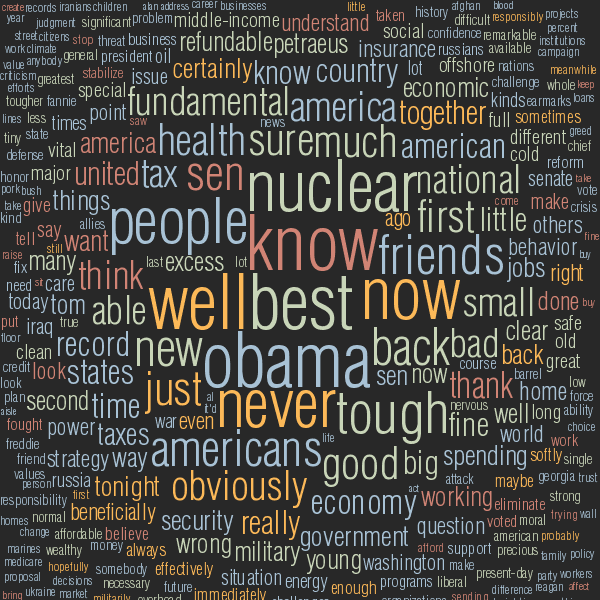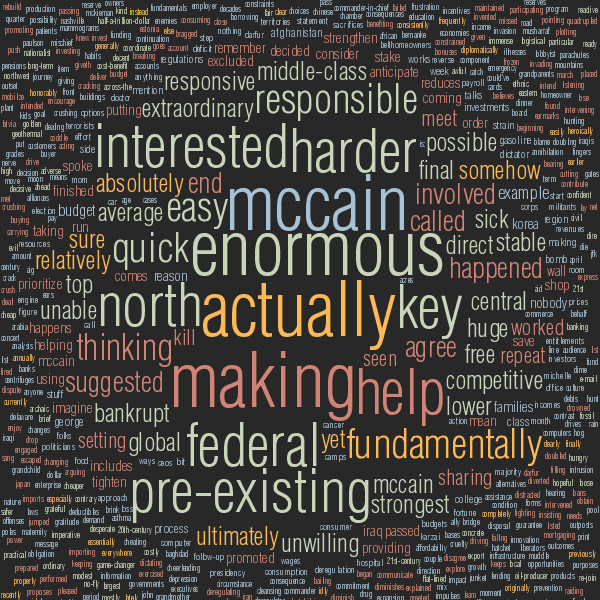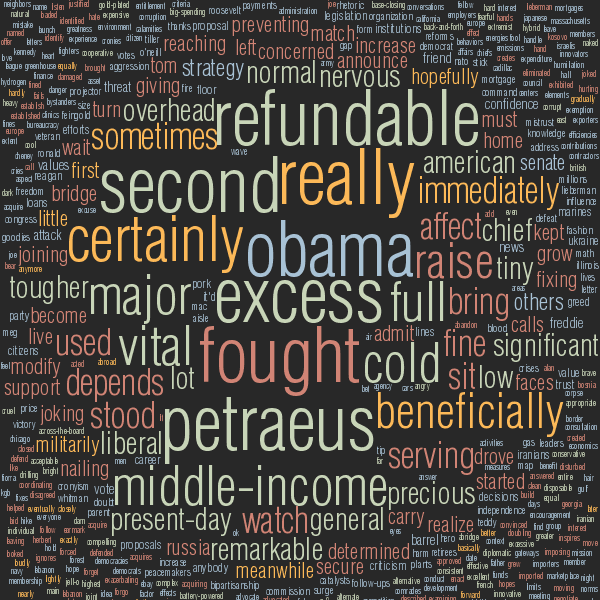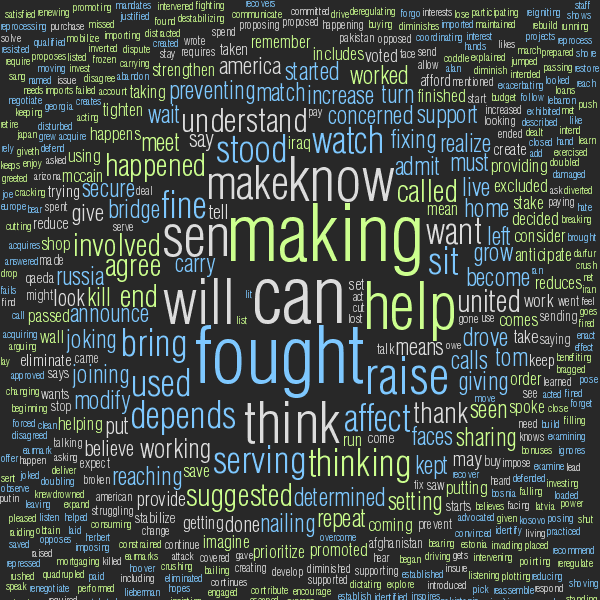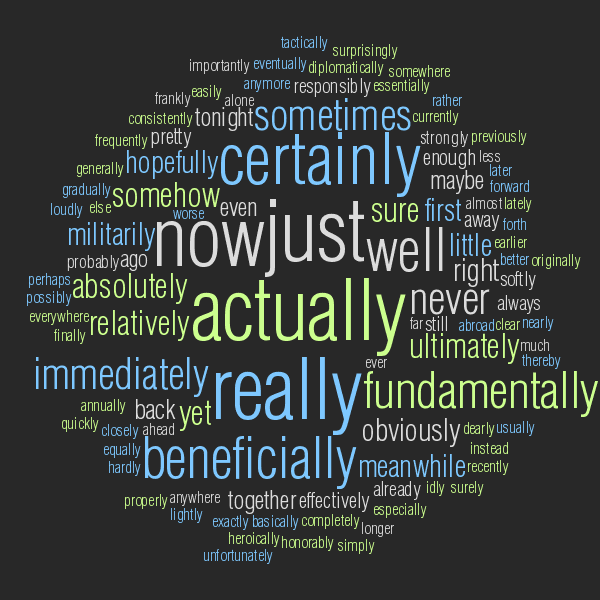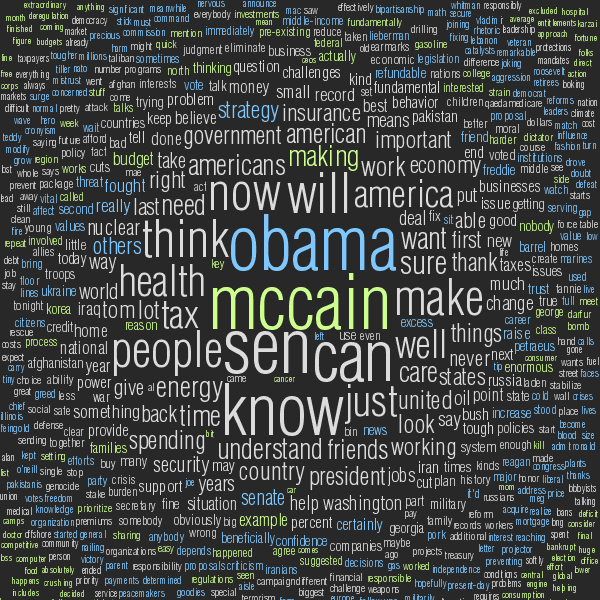Word Analysis of 2008 U.S. Presidential Debates
Barack Obama vs. John McCain (2nd debate)
7 October 2008
Word Statistics
Debate Word Count
Summary Word Count
The summary word count reports the total number of words and the
number of unique, non-stop words
used by each candidate. Word number is expressed as both absolute and relative values.
Table 1. Number of all words and unique words used by each speaker.
Table 1 Analysis
Proportions of total and unique words are similar to those of the first debate.
Overall, the 2nd debate saw fewer words (13,485 vs 14,572, a decrease of +7.5%. As before, Obama contributed more words to the debate, with 7,031 words vs 6,454 for McCain (+8.9% more — compare this to the 7% difference seen in the first debate).
The difference in the fraction of unique words for both candidates was greater than seen in the first debate. Here, Obama edged over McCain by +3.4%.
Table 1 Legend
Stop Word Contribution
In the table below, the candidates' delivery is partitioned into stop and non-stop words. Stop words are frequently-used bridging words (e.g. pronouns and conjunctions) and do not carry inherent meaning. The fraction of words that are stop words is one measure of the complexity of speech.
Table 2. Expanded analysis of total, stop and non-stop word count.
Table 2 Analysis
Stop word contribution for the 2nd debate is virtually identical to what was seen for the first debate. Actually, this is a little creepy.
In the first debate stop words accounted for 56.6% and 55.7% of words by Obama and McCain. In this debate, the numbers are 56.8% and 55.7%.
Table 2 Legend
All further analysis uses debate content that has been filtered for stop words.
Word frequency
The word frequency table summarizes the frequency with which words were used. Specifically, the average word frequency and the weighted cumulative frequencies at 50 and 90 percentile. The average word frequency indicates how many times, on average, a word is used. For a given fraction of the entire delivery, the weighted cumulative frequency indicates the largest word frequency within this fraction (details about weighted cumulative distribution).
Table 3. Average, 50%, and 90% weighted cumulative word frequencies (content filtered for stop words).
Table 3 Analysis
Word frequency profile is also virtually identical to the first debate. Obama continues with a slighly higher average word frequency.
Table 3 Legend
Sentence Size
Table 4. Number of words in a sentence, as measured by average number of words, 50% and 90% weighted cumulative values for three word groups (all words, stop words and non-stop words).
Table 4 Analysis
In the second debate, McCain' sentences were significantly
shorter than in the first debate (6.5 words vs 7.1 words), whereas for
Obama sentence length remained relatively constant (7.5 vs 7.7). The
first debate was a podium format and the second, a town-hall format in
which some questions were asked by the audience. This more informal
approach, where the candidates were engaging directly with the
audience members as well as interjecting each other, likely
contributed to the shorter sentences. Interestingly, McCain was more
susceptible to this than Obama, whose sentence length was virtually
identical to that in the more formal debate.
Table 4 Legend
Part of Speech Analysis
In this section, word frequency is broken down by their part of speech (POS). The four POS groups examined are nouns, verbs, adjectives and adverbs. Conjunctions and prepositions are not considered. The first category (n+v+adj+adv) is composed of all four POS groups.
Part of Speech Count
Table 5. Count of words (total and unique) categorized by part of speech (POS).
Table 5 Analysis
The difference in adverb use seen in the first debate disappeared. Instead, use of adjectives showed greater split, with their use increasing for Obama (15.8% vs 15.1%) and remaining constant with McCain (14.2%). The number of unique adjectives dropped for Obama by 2.5% (42.3% for this debate and 45.1% for the first debate) whereas McCain' unique adjectives radically increased (49.9% for this debate and 45.1% for the first debate).
McCain also showed lower noun use from the first debate (50.8% for this debate vs 53.8% for the first debate), instead increasing his verb use (28.6% for this debate vs 26.5% for the first debate).
Other than adjectives, Obama' part of speech breakdown was relatively unchanged.
Table 5 Legend
Part of Speech Frequency
Table 5. Frequency of words by part of speech (POS).
Table 5 Analysis
The second debate saw quite a few differences in the frequency of parts of speech.
Although noun frequency remained relatively the same, McCain was
seen repeating more verbs than Obama, a reverse of the first debate. Here, McCain's average verb frequency was 2.17 (2.06 in the first debate) and Obama's was 2.08 (2.10 in the first debate).
The use of both adjectives and adverbs saw changes. McCain decreased the repetition of adjectives from 2.22 in the first debate to 2.00 in this debate and slighly upped his adverb frequency from 2.55 to 2.62. Obama on the other hand reduced adverb repetition significantly from 2.92 to 2.53.
Table 5 Legend
Part of Speech Pairing
Through word pairing, I attempt to capture the contextual use of parts of speech within a sentence and extract concepts from the text. Specifically, unique pairs of words indicate complexity and inter-relatedness between concepts in a sentence.
Table 6a (Barack Obama). Word pairs (total and unique) categorized by part of speech (POS) for Barack Obama.
Table 6b (John McCain). Word pairs (total and unique) categorized by part of speech (POS) for John McCain.
Table 6c (Barack Obama vs John McCain). Word Pairs (total and unique) categorized by part of speech (POS) for both candidates.
Table 6 Analysis
Compared to the first debate, the number of unique pairs relative to all pairs for a given part of speech group remained unchanged, with the exception of adverb/adjective pairs. In the first debate Obama's unique component was 83.3% and McCain's 90.4%. In this debate these values are 88.2% and 82.0% respectively. Obama repeated the same adjective/adverb pairs, whereas McCain decreased his repetition.
Given that Obama's sentences were longer for this debate than McCain's (and by a larger margin than for the first debate), it is a surprise that the total number of word pairs was not significantly lower for McCain for this debate. In fact, most of the Obama/McCain pairing ratio values increased (e.g. verb/noun increased from 80.5% to 84.6%, verb/verb from 82.2% to 91.0%, adverb/noun from 72.4% to 80.3%, adverb/verb from 70.9% to 90.2%). The largest drop was in the adjective/adjective pairings, from 78.7% in the first debate to 65.4% in this debate.
Table 6a,b Legend
Table 6c Legend
Word usage
This section enumerates words that were unique to a canddiate
(e.g. used by one candidate but not the other). For a given part of
speech, the table breaks down the number of words that were spoken by
only one of the candidates or both candidates (intersection). The last
row includes all words (union).
Table 7. Total and unique words used exclusively by a candidate or by both candidates.
Table 7 Analysis
Obama lowered his adverb use from 6.9% in the first debate to 5.3%. McCain, on the other hand, found a new penchant for them and his speech now had 6.1% adverb content, from 5.2%. Obama' decrease adverb use was accompanied by a higher unique adverb ratio — he not only used fewer adverbs, he repeated them less frequently.
McCain also increased his adjective use from 14.4% to 16.8% and decreased repetition of them.
McCain used fewer verbs and his unique contribution to the debate also fell. In the first debate, he contributed 39.9% unique verbs to the debate. The second time around, he only contributed 35.0%. This difference was offset with Obama's decreased unique adverb contribution, from 39.8% to 35.8%.
Table 7c Legend
Noun Phrase Usage
Noun phrases were extracted from the text and analyzed for frequency, word count, unique word count and richness.
Top-level noun phrases are those without a parent noun phrase (a parent phrase is one that a similar, longer phrase). Derived noun phrases are those with a parent (more details about noun phrase analysis).
The top-level noun phrases can be interpreted as independent concepts. Derived noun phrases can be interpreted as variants on concepts embodied by the top-level phrases.
Noun Phrase Count
This table reports the absolute number of noun phrases, which is related to the number of total words (specifically, nouns) delivered. The next table presents the number of phrases relative to the number of nouns.
Table 8. Number of noun phrases.
Table 8 Analysis
Obama delivered slightly more noun phrases than McCain on this debate (+2.6% more), a difference smaller than for the first debate, where he delivered 4% more phrases. This time, McCain had relatively more top-level phrases than Obama, at 48.4%, increasing his relative top-level noun phrase by more than 3% from the previous debate. McCain also delivered a greater fraction of unique top-level phrases, at 96.6%, relative to the first debate (92.8%).
Obama's noun phrase profile is relatively unchanged from the first debate. He did, however, deliver slightly greater fraction of unique phrases during this debate, at 84.3% (vs 82.4% for the first debae).
Table 8c Legend
Noun Phrase Richness
The previous table presented the total number of noun phrases, which can be equated to individual concepts. In this table, this value is shown relative to the number of nouns used. The interpretation of this ratio is that of richness. In other words, how many noun phrases were constructed, per noun.
Table 9. Number of noun phrases relative to the number of nouns.
Table 9 Analysis
The difference in the richness of all phrases was smaller between the candidates for this debate. In the first debate, the difference was +8.4% in favour to Obama and during this debate this dropped to +3.7%, still in Obama's favour.
McCain's uniqueness for top-level noun phrases dropped from 0.61 in the first debate to 0.56, whereas Obama's increased slightly.
Table 9c Legend
Noun Phrase Frequency and Size
Table 10. Noun phrase frequency, word count and unique word count.
Table 10 Analysis
Noun phrase frequency dropped slightly for both candidates for this debate, but the drop is minor. Word counts remained the same.
Table 10c Legend
Windbag Index
The Windbag Index is a compound measure that characterizes the complexity of speech. A low index is indicative of succinct speech with low degree of repetition and large number of independent concepts.
Table 11. Windbag Index for each speaker. The higher the value, the greater the degree of repetition in the speech.
Table 11 Analysis
Obama's Windbag Index is still higher than McCain's. The difference is the same as seen in the first debate. The index dropped slightly for both candidates, compared to the first debate, suggesting that the town hall format contributes to less repetitive and long-winded speech.
When individual index terms are compared, Obama maintains a stronger showing in the noun phrase component — all of his terms are higher than McCain' (i.e. contributing to a lower index). Obama continues to do better with verbs, but does significantly better with adverbs than in the first debate.
Table 11c Legend
Tag Clouds
In the tag clouds below, the size of the word is proportional to
the number of times it was used by a candidate (tag cloud details).
Not all words from a group used to draw the cloud fit in the
image. Specifically, less frequently used words for large word groups
fall outside the image.
Debate Tag Clouds for Each Candidate — All Words
Each candidate's debate portion was extracted and frequencies were
compiled for each part of speech (noun, verb, adjective, adverb), with
words colored by their part of speech category. The words in these
tag clouds include words unique to one candidate as well as words used by
both candidates. For other tag clouds below, only words unique to a
candidate are used.
Keep in mind that the word sizes between tag clouds cannot be
directly compared, since the minimum and maximum size of the words in
each tag cloud is the same. However, the distribution of sizes within
a tag cloud reflects the frequency distribution of words (tag cloud details).
Debate Tag Cloud for Barack Obama — all words
Debate Tag Cloud for John McCain — all words
Debate Tag Cloud Analysis
The main words in Obama' tag cloud remain the same: "just", "think", "important". It is interesting to see the word "nuclear" disappear from the center of the cloud. The main new word is "health", a testament to a major topic of the debate.
McCain, on the other hand, continues to use "nuclear" and in fact the relative frequency of this word is larger than before. "friends" now appears large, as do instances of "america", "american" and "americans". Presumably McCain is attempting to connect to the swing voters.
Debate Tag Clouds for Each Candidate — Unique Words
The tag clouds below show only used exlusively by a candidate. For
example, if candidate A used the word "invest" (any number of times),
but the other candidate B did not, then the word will appear in the
unique word tag cloud for candidate A.
Debate Tag Cloud for Barack Obama — words unique to Barack Obama
Debate Tag Cloud for John McCain — words unique to John McCain
Unique Word Tag Cloud Analysis
For Obama, "actually" takes center stage, displacing "absolutely" from the first debate. Obama's cloud now has a more prominent central component, suggesting that he repeated certain words with relatively higher frequency than in the first debate. Words with relatively increased frequency are "interested", "harder" and "enormous". Note that these tag clouds show words exclusive to a candidate. McCain did not use "intersted" or "harder".
McCain continues to press with "fought" and "petraeus", words consistenly avoided by Obama. McCain' use of "nervous" is interesting — certainly not a word that soothes.
Part of Speech Tag Clouds
In these tag clouds, words by both candidates were categorized on the
basis of exclusivity to a candidate. Words unique to each candidate
are drawn with a different color. Words used by both candidates are
shown in grey.
The size of the word is relative to the frequency for the candidate
— word sizes between candidates should not be used to indicate
difference in absolute frequency.
Words were further cateogorized by part of speech (noun, verb,
adjective, adverb) and individual tag clouds were prepared for each
category.
The last tag cloud in this section, which uses all (noun + verb +
adjective + adverb) parts of speech.
Tag Cloud of noun words, by speaker
Noun Tag Cloud Analysis
The noun tag cloud shows fewer words exclusive to Obama with high relative frequencies. The sea of green in the cloud from the first debate is replaced by a more even mixture of green/blue words. In fact, words unique to each candidate were used with relatively lower frequency in this debate, when compared to the most frequently used words.
Tag Cloud of verb words, by speaker
Verb Tag Cloud Analysis
Obama says "making" and "help", whereas McCain presses for "control" and "fought". Obama' use of verbs was more varied in this debate, as indicated by fewer large words in this cloud.
Tag Cloud of adjective words, by speaker
Adjective Tag Cloud Analysis
The adjective tag cloud has significantly different morphology in this debate when compared to the cloud from the first debate. Plainly, there are more large words in this debate' cloud, indicating more words with relatively high frequencies.
McCain repeted adjectives like "refundable" and "excess", with Obama using "enormous", "federal", "responsible" and "interested" relatively more frequently than before.
Note the much less prominant "nuclear" in this debate — presumably people in the town forum were more interested in notions better described by "responsible", "federal", and "middle-income".
Tag Cloud of adverb words, by speaker
Adverb Tag Cloud Analysis
Adverbs are weakly used by both candidates. Most of them are relatively generic. However, McCain is seen using "militarily" in relative high abundance.
Tag Cloud of all words, by speaker
All Tag Cloud Analysis
Once all parts of speech are mixed, both candidates showed less repetition of exclusive words, as indicated by the larger proportion of grey words.
Word Pair Vignette Tag Clouds for Each Candidate
Tag Cloud of word pairs by Barack Obama
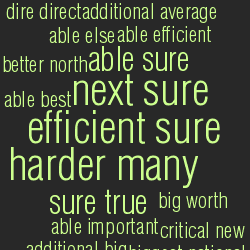
▲
adjective/adjective by Barack Obama
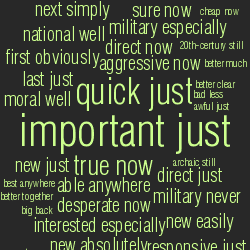
▲
adjective/adverb by Barack Obama

▲
adjective/noun by Barack Obama

▲
adjective/verb by Barack Obama

▲
adverb/adverb by Barack Obama

▲
adverb/noun by Barack Obama

▲
adverb/verb by Barack Obama
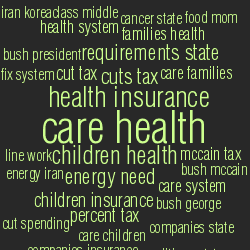
▲
noun/noun by Barack Obama

▲
noun/verb by Barack Obama

▲
verb/verb by Barack Obama
Word Pair Tag Cloud Analysis for Barack Obama.
A huge difference in Obama' noun/noun cloud, with extremely prominent (i.e. repeated) "care health", "health insurance", "children health" and "energy need". Obama' noun/noun cloud from the first debate was much flatter, showing less repetition.
Tag Cloud of word pairs by John McCain

▲
adjective/adjective by John McCain

▲
adjective/adverb by John McCain
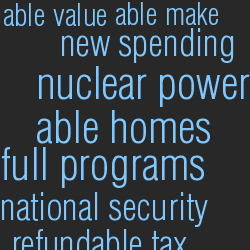
▲
adjective/noun by John McCain

▲
adjective/verb by John McCain

▲
adverb/adverb by John McCain

▲
adverb/noun by John McCain
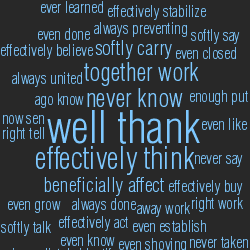
▲
adverb/verb by John McCain

▲
noun/noun by John McCain
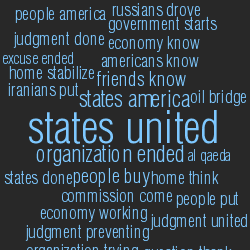
▲
noun/verb by John McCain

▲
verb/verb by John McCain
Word Pair Tag Cloud Analysis for John McCain.
McCain continues with military concepts in his adjective/noun cloud, with "nuclear power" and "national security" being very prominent. It is clear from McCain' noun/noun cloud that health care was a huge topic, because McCain shifted his speech from a stance that focused on military and threats to "care health", "american people" and "homes value".
Downloads
debate transcript (courtesy of CNN).
parsed word lists (analyzed transcript, including words by speaker, by POS, and all POS pairings).
tag cloud images
data structure
Please see the methods section for details about these files.


